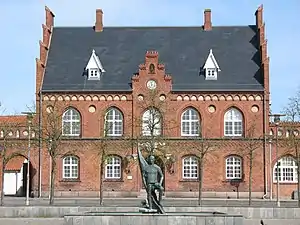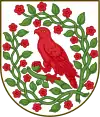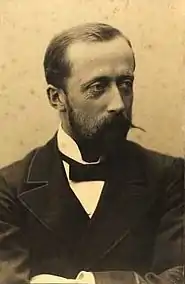Frederikssund
Frederikssund (Danish pronunciation: [fʁeðʁekˈsɔnˀ]) is a Danish town, seat of the Frederikssund Municipality, in the Region Hovedstaden with a population of 16,337 (1 January 2020).[1] It received the status of market town in 1810. The town is famous for its annual Viking Games as well as for the J.F. Willumsen museum. Since 1935, it has been connected to Hornsherred via the Kronprins Frederik Bridge.[2]
Frederikssund | |
|---|---|
 Town hall | |
 Coat of arms | |
 Frederikssund Location in Denmark | |
| Coordinates: 55.83330°N 12.06659°E | |
| Country | Denmark |
| Region | Capital (Hovedstaden) |
| Municipality | Frederikssund |
| Government | |
| • Mayor | John Schmidt Andersen |
| Area | |
| • Urban | 8.16 km2 (3.15 sq mi) |
| Population (2020) | |
| • Urban | 16,337 |
| • Urban density | 2,000/km2 (5,200/sq mi) |
| Demonym(s) | Frederikssunder |
| Time zone | UTC+1 (Central Europe Time) |
| • Summer (DST) | UTC+2 |
History

There is evidence of communities dating right back to the stone age with a number of burial sites in the area. It seems probable that there was a small settlement at the present location of Frederikssund in the Middle Ages but the development of the town probably began in the 12th century with the construction of a church at what was then known as Ude Sundby[3] or Sundby Færge (Sundby Ferry). Located at a narrow point on Roskilde Fjord, Sundby Færge became the harbour for the nearby market town of Slangerup.
In 1809-10, the status of market town was transferred from Slangerup to Frederikssund, named after King Frederik III.[4] In 1868, a pontoon bridge linking Frederikssund to Hornsherred was opened.[5] This was replaced by today's Kronprins Frederik Bridge in 1935.
Frederikssund's rapid expansion from a small town at the end of the 19th century is due in large part to the railway connection with Ballerup in 1879 which was upgraded to a frequent suburban service to Copenhagen in 1989.
Geography
Frederikssund is located on the east coast of Roskilde Fjord, about 45 km north-west of Copenhagen, 20 km south of Hillerød and 30 km north of Roskilde. It is less than an hour from Copenhagen by either road or rail. S-trains (suburban commuter trains) leave about once every 10 minutes. Copenhagen Airport can be reached by road or rail in about an hour.
The low hills on which Frederikssund lies are formed of moraines from the last Ice Age. The shallow Roskilde Fjord which separates Frederikssund from Hornsherred originated in the same period.
The fertile land surrounding Frederikssund is used for mixed farming - with an emphasis on cereals, root crops and pigs.
Frederikssund today
The recent development of the town center and the old commercial harbour have given Frederikssund a new look which reflects its growing popularity as a residential area with connections to Copenhagen and surroundings. It has all the facilities associated with a modern Danish town: museums, a public library, supermarkets, a hospital and sports and recreation centers. With a location facing west over the Roskilde Fjord, it has many footpaths along the shores and up into the higher ground to the east. The local rail and bus services are well developed.
Culture
Cultural attractions include the J.F. Willumsens Museum,[6] the Færgegården local history museum[7] at the far end of the bridge over to Hornsherred, and the annual Viking plays[8] held in a large outdoor theatre.
Notable people

- Albert Jensen (1847–1913) a Danish architect
- Eugen Jørgensen (1858–1910) a Danish architect and local politician
- Georg Achen (1860–1912) a naturalist painter, from 1890 he specialized in portraits
- Oluf Pedersen (1891 in Lille Rørbæk - 1970) a Danish politician and member of the Folketing 1932-45 and 1950–60
- Povl Søndergaard (1905 — 1986 in Frederikssund) sculptor of lifelike busts and female figures
- Peter Alsing Nielsen (1907–1985) a painter, used subdued colour and simple, precise lines
- Regin Prenter (1907–1990) a Danish Lutheran priest, theologian and parish priest of Branderup
- Jette Thyssen (born 1933) a Danish textile artist, painter and lithographer
- Annie Birgit Garde (born 1933) a Danish film actress [17]
- Grethe Ingmann (1938 – 1990 in Frederikssund) a Danish singer [18]
- Countess Anne Dorte of Rosenborg (1947–2014) a Danish countess and widow of the late Count Christian of Rosenborg (1942–2013), the grandson of King Christian X of Denmark
- Jens Galschiøt (born 1954) a Danish sculptor, best known for the Pillar of Shame
- Morten Messerschmidt (born 1980) a Danish politician and MEP
Sport
.jpg.webp)
- Vilhelm Johansen (1898–1993) a sports shooter, competed at the 1936 Summer Olympics
- Morian Hansen (1905–1995) a motorcycle speedway rider & RAF Squadron Leader
- Kresten Bjerre (1946 – 2014 in Frederikssund) a Danish footballer with over 330 club caps and 22 caps for Denmark
- Martin Haldbo Hansen (born 1969) a Danish rower, competed in the 1996 Summer Olympics
- Anders Kristiansen (born 1979) a Danish male badminton player
- Mathias Boe (born 1980) badminton player, team silver medallist in the 2012 Summer Olympics
- Mie Skov (born 1986) a retired table tennis player, competed in the 2012 Summer Olympics
Twin towns - sister cities
Frederikssund is twinned with:[19]
|
See also
References
- BY3: Population 1st January, by urban areas The Mobile Statbank from Statistics Denmark
- Frederikssund. From Den store Danske. In Danish. Retrieved 22 January 2010.
- History of Frederikssund Church from Frederikssund Kirke. Retrieved 8 January 2007.
- History of Frederikssund's town hall from Dansk Center for Byhistorie Archived 27 September 2007 at the Wayback Machine. Retrieved 8 January 2007.
- Historical descriptions for the Færgegården local history museum. Retrieved 11 January 2007.
- "J.F. Willumsens Museum". Jfwillumsensmuseum.dk. Archived from the original on 2 March 2012. Retrieved 31 December 2012.
- "Planning your trip" (in Lingala). VisitDenmark. Retrieved 31 December 2012.
- Kategori: Nyheder (27 December 2012). "vikingespil.dk". vikingespil.dk. Retrieved 31 December 2012.
- "frederikssundsejlklub.dk". frederikssundsejlklub.dk. Retrieved 31 December 2012.
- "frederikssund-roklub.dk". frederikssund-roklub.dk. Retrieved 31 December 2012.
- fjordstien.dk
- "Frederikssund Golf Klub, DK-3630 Jægerspris, Denmark". Golfonline.dk. 7 March 2007. Retrieved 31 December 2012.
- "f-f-f.dk". f-f-f.dk. Retrieved 31 December 2012.
- frederikssundik.dk
- "oaks.dk". oaks.dk. Retrieved 31 December 2012.
- "Archived copy". Archived from the original on 17 September 2008. Retrieved 22 January 2010.CS1 maint: archived copy as title (link)
- IMDb Database retrieved 24 June 2020
- IMDb Database retrieved 24 June 2020
- "Venskabsbyer". frederikssund.dk (in Danish). Frederikssund Kommune. Retrieved 2 November 2019.
External links
![]() Media related to Frederikssund at Wikimedia Commons
Media related to Frederikssund at Wikimedia Commons